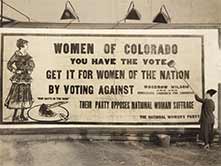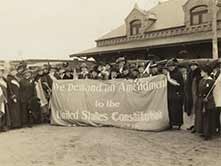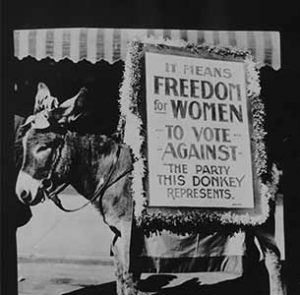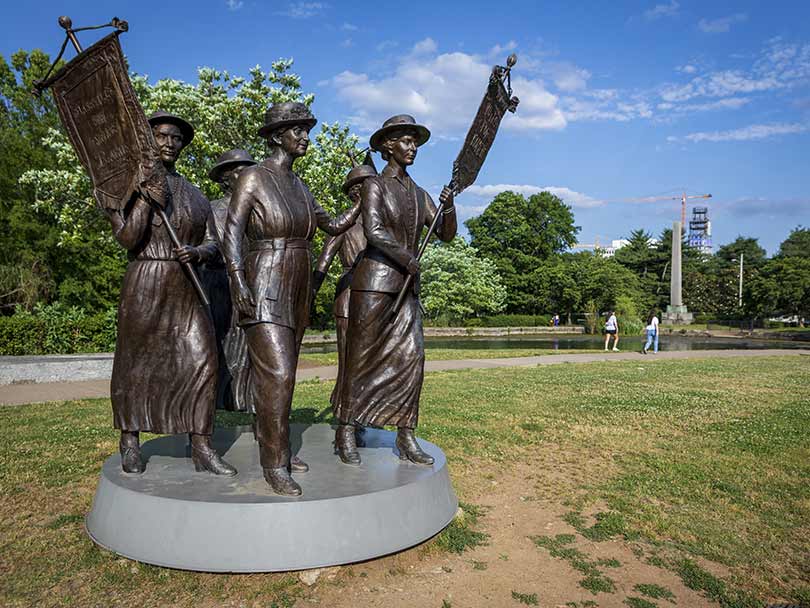By Derrill Holly
The 19th Amendment to the U.S. Constitution was approved by Congress on June 4, 1919, but it took more than a year for the measure granting women nationwide the right to vote to gain ratification by 36 states. This August 18, 2020, the nation marks the centennial of this human rights milestone.
Rural America was built and owes much of its success to family-run farms and businesses, operated by men and women. While dads and husbands are often celebrated for their contributions, wives and mothers have been full partners in creating thousands of communities, especially here in the West, where the right to vote came to women years before the 19th Amendment was ratified.

The Vast Billboard Campaign of the Woman’s Party put up a billboard in Denver in 1916. Photo source: Library of Congress
Wyoming, Utah, Washington and Montana territories all granted women the right to vote long before the Constitutional Amendment passed. Colorado was the first state to pass a popular vote giving women the right to vote and it was the first state to elect women to a state legislature. Western women were more than ready to put their skills to use leading their communities.
Power and partnership
“Historically, rural wives were always isolated and only had interaction with their husbands and children, but they helped run farms and ranches, and ran their homes,” said Betsy Huber, president and CEO of the National Grange.
Founded in 1867, the Grange chapters took root as fraternal community organizations committed to promoting sound agricultural concepts in the North, the South and the expanding West.
“From the very beginning, women could hold any office in the Grange,” Huber said. “We have 13 offices, including four that are only open to women.”
By the early 1900s, organizations like the Grange were providing rural women with meaningful leadership opportunities and fueling passions for full engagement in public life that included political participation.
With the rise of suffragist sentiments in the early 20th century, the Grange routinely included women in governance decisions, Huber said. “One of our national agriculture committees early in the last century had six members, including three men and three women, who reviewed and discussed the resolutions submitted by local Grange chapters that ultimately set policy for the National Grange.”

Suffragists gather outside the depot of the Atchison, Topeka and Santa Fe Railway Company in Colorado Springs, Colorado, with a banner: “We Demand an Amendment to the United States Constitution.” Photo source: Library of Congress
Among the farm women embracing the suffragist cause was Febb Ensminger Burn, a widow from Tennessee’s McMinn County who ultimately played a decisive role in earning women the right to vote and forever changing U.S. history.
“Suffrage has interested me for years,” Burn once told a reporter.
Between running her farm and caring for her family, she followed news accounts from Nashville and was turned off by harsh opposition speeches against ratification in the summer of 1920. In August, she penned a seven-page letter to her son, Henry T. Burn, a freshman representative in the House of Representatives of the Tennessee General Assembly.
“Vote for suffrage and don’t keep them in doubt,” Burn wrote to her 24-year-old son. “Don’t forget to be a good boy and help.”
With the letter from his mom in his pocket, Rep. Burn broke a 48-48 deadlock by changing his vote to pass the measure, and women nationwide were guaranteed the right to participate in all national elections.

A donkey carries a sign urging a vote in favor of the 19th Amendment. Photo source: Library of Congress
“I spend a lot of my time encouraging co-op members to contact their legislators, and mother-son influence is a great example of true grassroots activism,” said Amanda Wolfe, a National Rural Electric Cooperative Association senior political advisor, who lives in Nashville.
“Voting is so much more than just a right, it is a privilege,” Wolfe said. “The suffragettes fought for generations to finally win that privilege 100 years ago, and every time we cast a ballot, we honor their memories.”
Fueling cooperative change
When electric cooperatives were organized years later, many of the same principles honored by rural organizations, including recognition of property rights, were among the fundamental tenets included in co-op charters. Family memberships were vested in heads of households, regardless of gender, and women were among the founding members of many electric cooperatives.
When President Franklin Delano Roosevelt created the Rural Electrification Administration in 1935, farm magazines quickly published stories about the news. Maye Shaw of Quitman, Texas, was a former teacher and regular reader who knew life on the farm would be easier with electric power.
She wrote Rep. Morgan G. Sanders for information on the new electric co-ops and persuaded her husband Virgil Shaw to look into it. By 1937, they both were riding through the surrounding countryside recruiting members and collecting $5 sign-up fees. Mr. Shaw eventually became the founding general manager of Wood County Electric Cooperative, which now serves nearly 36,000 meters and is still headquartered in Quitman. In 1939, when the Rural Electrification Administration approved its first loans for electric cooperatives in South Carolina, women were actively involved in the formation of Darlington-based Pee Dee Electric Cooperative.
Mrs. E.S.J. Evans, the home demonstration agent for the Darlington County Agricultural Extension Service Office, was an organizer, and Miss Sue Coker and Mrs. E.A. Gray were elected to the founding board.
Acting for the future
America’s electric cooperatives support Co-ops Vote, a grassroots movement designed to encourage voter registration, political engagement and participation by everyone in local, state and national affairs.
“We provide the information to co-op consumer-members to find out how, where and when to vote, and information on the issues that affect rural communities,” said Laura Vogel, an NRECA senior political advisor. “We do not tell people who to vote for, and we don’t endorse candidates.”
Co-ops want their consumer-members to vote. They want the rural voice to be heard. Voting in the upcoming election is a great way to celebrate the passage of the 19th Amendment and honor those suffragettes who worked hard to win the right for women to vote.
Derrill Holly writes on consumer and cooperative affairs for the National Rural Electric Cooperative Association, the national trade association representing more than 900 local electric cooperatives.

